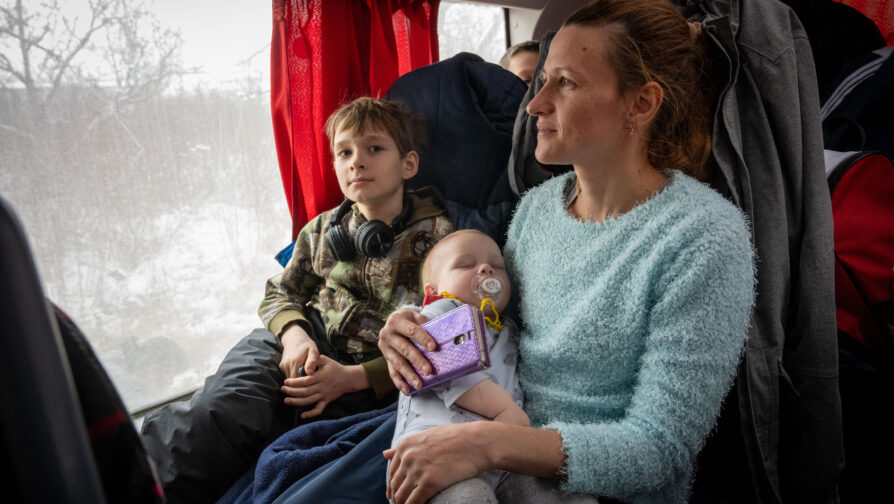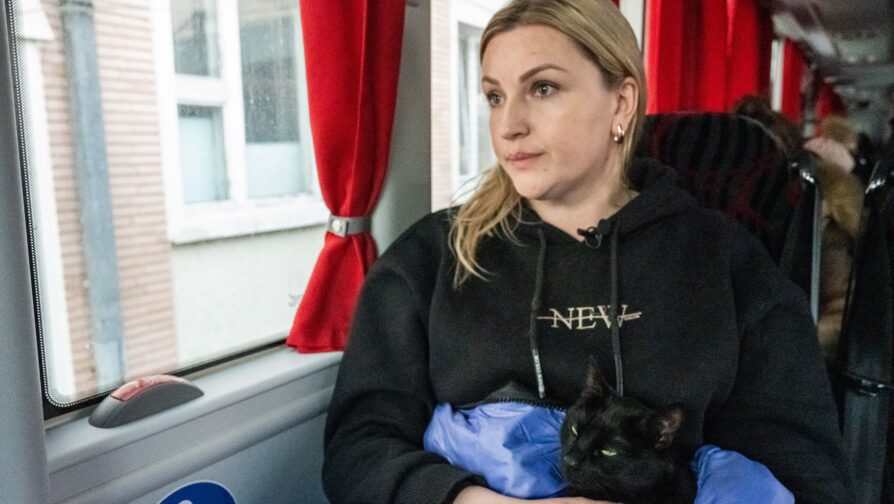Refugees fleeing Ukraine to Moldova find onward passage to Romania
Under leaden skies at the remote Palanca border crossing in southeastern Moldova, groups of refugees from Ukraine brave the bone-chilling wind as they watch their bags and other belongings being loaded onto five waiting buses for the five-hour journey to Huși in Romania.
They are among 250 refugees including older people, families with young children and lone women being prioritized for transfer to Romania from Moldova – a country on Ukraine’s southern border with limited resources to deal with the hundreds of thousands of refugees that have arrived there in recent weeks.
Once all the passengers are finally on board, the sun briefly breaks through the clouds, throwing the gray surroundings into dazzling focus as the convoy moves off. Some of the travelers give in to exhaustion and sleep, while others check their phones for news of loved ones back in Ukraine.
“The worst has befallen us.”
Natalia holds her sleeping 8-month-old daughter in her arms, with her 6-year-old son sitting in the window seat alongside. The 35-year-old accountant fled the city of Mykolaiv along with three friends and their children. All four women have left their homes and their husbands behind.
“The worst has befallen us,” Natalia says, holding back tears. Before joining up with the rest of the group for the two-day journey to the border, she and her family spent days sheltering in a bunker in the city. “Many times, there were bombs, artillery, rockets, and attacks. Our children were very scared,” she says, adding that she wants to be able to go home “maybe in two or three weeks,” but more in hope than conviction.

Natalia, 35, and her two children ride the bus to to Huși in Romania after fleeing to Moldova from their home in Mykolaiv, southern Ukraine. © UNHCR/Mihai Eremia
On another of the buses, Viktoria, 37, sits by herself with a black cat wrapped in a coat on her lap. On the second day of fighting, she sent her teenage daughter from their home in Odesa on an evacuation flight to Turkey with her sister and brother-in-law. She now plans to join another sister living in Italy before travelling to Istanbul to collect her daughter.
“My cat was allowed to cross the border. It is a blessing that we can bring our pets with us as I do not have veterinary documents,” Viktoria says. “This cat is a member of our family. We found her on the street a year ago, [she is] a stray.”
Despite knowing that her daughter is safe and escaping herself, Viktoria is unable to relax. “All this is so scary. I have crossed the border now, and I still do not feel safe,” she says. “Honestly, I do not feel relieved. Relief will come when the war ends.”

Viktoria, 37, took the family cat with her when she left her home in the Ukrainian Black Sea port of Odesa. © UNHCR/Mihai Eremia
The bus transfers have been arranged as a gesture of solidarity with the people of Moldova by the governments of both countries, and with the support of UNHCR, the UN Refugee Agency, and IOM, the International Organization for Migration. Up to three convoys per day have departed from Palanca since the first on 10 March, and will continue as long as necessary to reduce congestion at Moldova’s border and protect women, girls and others from risks including human trafficking and gender-based violence.
“Romania is helping Moldova to move refugees to its territory,” explains Roland Schilling, UNHCR Representative for Central Europe. “This is urgently needed because Moldova has already seen an influx of 300,000 people, of which 110,000 are staying. This is a tremendous burden for a small country like Moldova, with limited resources.”
Staff from UNHCR and IOM are on hand throughout the journey, offering advice to those trying to decide what to do next and providing information on subjects from securing medicines to booking free travel tickets and finding SIM cards.
“This is the first convoy today taking people from the border of Moldova-Ukraine to Romania,” says Batyr Sapbyiev, a protection officer at UNHCR Romania, who rode on one of the buses. “This is very important because it helps decongest the situation. Moldova is very crowded, and the reception capacity is overwhelmed. Services will be provided in Romania and people will choose whether they remain or continue to other countries.”
- See also: UN supports initiative to fast-track transfer of people fleeing Ukraine to Romania through Moldova
When the buses reach Huși, a city a few kilometres inside Romania’s eastern border with Moldova, the refugees are welcomed at a transit centre by the Romanian Emergency Situations Department, with support from UNHCR and IOM staff. Some of them will spend the night here, while others plan to head to the capital Bucharest or other cities.
Among those heading onwards is 16-year-old Mihail, also from Odesa, who is travelling with his mother to stay with an aunt in Slovakia. “Before I left Odesa, in my school we talked about security measures, we were told what we have to do if we hear the air-raid siren, where we have to hide, how we are supposed to provide first aid and so on,” he says.
“Before the war, I saw my future as rainbow-coloured and bright. I was about to finish 11th grade and pass the mandatory exams. But now … there is practically no studying, so I am missing a big part of the curriculum,” Mihail adds. “When the war ends completely in Ukraine, we will return immediately. I truly want that to happen as soon as possible.”
Page 1 of 10
-

European Union support enabled UNHCR to deliver critical assistance to Ukrainian refugees and Moldova’s most vulnerable
31 Mar 2025Chișinău, Moldova – 31 March 2025 – Between July 2023 and March 2025, the UN Refugee Agency (UNHCR), reached over 78,000 people—including refugees from Ukraine and vulnerable Moldovans—with critical assistance to meet their basic needs, enhance protection, and promote long-term inclusion in national systems. This multi-sectoral humanitarian response was funded by […]
-

A first step toward safety: monitoring at Moldova’s borders
31 Mar 2025Every day, Ukrainians fleeing war and uncertainty cross into Moldova at the Palanca border crossing, one of the country’s two main entry points from Ukraine. Even three years since the war’s escalation, while the initial waves of arrivals have decreased, families continue to arrive here each day – mothers with […]
-

Statement by UNHCR’s Filippo Grandi on the impact of global aid cuts on refugees
20 Mar 2025GENEVA – Brutal funding cuts in the humanitarian sector are putting millions of lives at risk. The consequences for people fleeing danger will be immediate and devastating: Refugee women and girls at extreme risk of rape and other abuse are already losing access to services that kept them safe. Children are being […]
-

Life goes on: A mother’s story of finding safety in Moldova and move forward
13 Mar 2025Natalia was on maternity leave from her job as a hairdresser in Odesa, Ukraine, when her world was turned upside down. In February 2022, as the full-scale invasion began, her quiet life with her young son was shattered by the sound of explosions. “At six in the morning, the bombing […]
-

Italy supports initiatives empowering vulnerable refugees and strengthening resilience in Moldovan host communities
11 Mar 2025CHIȘINĂU– The generous €2,000,000 contribution from the Italian Agency for Development Cooperation (AICS) will significantly boost support for refugees and the Moldovan communities that host them. This crucial funding will improve local capacities to provide inclusive and effective services, such as healthcare, education, and social support, benefiting both refugees and […]
-

FEBRUARIE 2022: ECOURI – Commemorating three years of war and resilience
24 Feb 2025Chisinau, Moldova, 24 February 2025 – To mark the third anniversary of the full-scale invasion of Ukraine, UNHCR, the UN Refugee Agency and the National Museum of Art of Moldova present FEBRUARIE 2022: ECOURI by Valeria Duca, an art exhibition which will open on 24 February 2025, at the National […]
-

UNHCR: After three years of war, Ukrainians need peace and aid
21 Feb 2025This is a summary of what was said by Philippe Leclerc, UNHCR Director of the Regional Bureau for Europe – to whom quoted text may be attributed – at today’s press briefing at the Palais des Nations in Geneva. 18 February 2025 GENEVA – Three years on, the full-scale war […]
-

25 years in support of refugees: The Story of CCR and Djavid Paknehad
6 Feb 2025Ahmad Djavid Paknehad is a well-known name among those actively involved in supporting refugees in Moldova. Originally from Afghanistan, he is now a citizen of the Republic of Moldova and the Director of the Charity Centre for Refugees (CCR), a refugee-led organisation that has provided concrete support to thousands of […]
-

A refugee’s journey of hope in Moldova
5 Feb 2025When you open the door of the recreational Centre Sunny Bunny, it is most certain that you will find Hanna Pavlova at its heart. Surrounded by children and by her employees, Hanna is attentive to everything that happens in the small business that she recently opened in Chisinau, Moldova’s capital. […]
-

Spain supports winter assistance for refugees in Moldova
31 Jan 2025UNHCR, the UN Refugee Agency, welcomes the generous contribution of EUR 850,000 from the Spanish Agency for International Development Cooperation (AECID) to support the protection of refugees from Ukraine in the Republic of Moldova. This contribution underscores Spain’s steadfast commitment to supporting displaced populations and promoting resilience during the harsh […]
